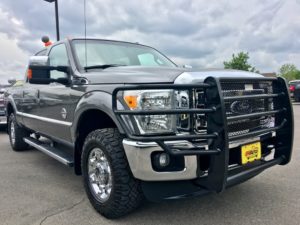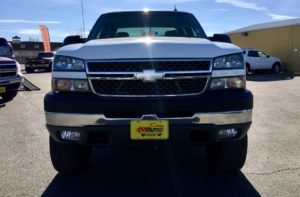Dye Autos Denver Area Truck and Automotive Blog
 How do you choose the best pickup truck for your needs? Answer the following seven questions and you’ll be much better equipped to decide when it comes time to buy.
How do you choose the best pickup truck for your needs? Answer the following seven questions and you’ll be much better equipped to decide when it comes time to buy.
1. Do you prefer a specific brand?
Is there a manufacturer that you’re partial to? Start with that brand.
If you haven’t shopped in awhile, keep your options open because your favorite brand many have changed specs and another brand might be a better option.
2. What do you plan on carrying or hauling?
How you plan to use the pickup truck will steer you through many of the choices and help you narrow the field.
- Towing a boat or Jet Ski? You might need four-wheel drive to gain traction on slippery boat ramps.
- Pulling a very large mobile home, you might need a “dually” (two rear wheels per side) for towing stability.
If you just like the idea of driving a pickup truck and don’t really plan on hauling anything major, a midsize truck such as the Toyota Tacoma, Chevrolet Colorado or Ford Ranger would be suitable considerations.
3. Compact, midsize or full size pickup truck?
Compact pickup trucks are smaller in scale than their larger size counterparts. They can usually tow up to about 3,000 pounds, a weight that accommodates many trailers and handles most boat towing tasks.
If you have heavier towing needs, move up to a mid-size or full-size truck.
Keep in mind that trucks considered ‘small’ in the past have grown in size and towing capability over the last decade.
Mid-size pickups can be closer in size and abilities to either a compact or to a full-size truck. Comparing models on dealer lots is the best way to understand how they actually look when placed side by side.
Dye Autos sells lots of pickup trucks and we can help you compare. Check out our post on pickup truck comparisons >>here<< and get in touch with us >>here<<
4. Standard, extended or crew cab?
How many people need to ride with you? Most manufacturers offer three cab sizes:
- Standard cab is the classic work truck with a single row of seating and limited space between the seats.
- Extended cab has jump seats or a bench seat behind the front seats. ProTip: Be sure to sit in the back while someone else drives the vehicle so that you have a feel for how it feels to ride in the back. Most extended cab seats are utilitarian and not intended for comfort during a long ride.
- Crew-cab trucks have four full-size doors and a generous backseat roomy enough for cross-country travel. Crew cabs are gaining in popularity now that many drivers use pickup trucks as their primary vehicle.
5. Standard or long bed?
The bed sizes vary slightly by manufacturer but are approximately 5.5 feet, 6.5 feet and 8 feet. Though it’s nice to have lots of room for cargo, combining a crew cab with an 8-foot bed might mean you can’t put the truck in your garage.
6. Planning on towing a trailer?
How much weight do you need to pull? Check the towing capacity of the pickup trucks you’re considering to make sure each one meets your needs.
You’ll need to find out the Gross Vehicle Weight Rating (GVWR) of what you’re going to tow.
You’ll find this on the trailer “VIN plate” (Vehicle Identification Number) or by contacting the trailer manufacturer. The GVWR is the dry weight of the trailer (empty weight) plus the maximum allowed payload.
- Your trailer may be as little as a 12-ft pop-up camper with a GVWR of under 3,000 lbs.
- Perhaps, it’s a behemoth conventional camping trailer that is 40-ft long and approaching 14,000 lbs GVWR.
- How about a triple-axle 43-ft long 5th-wheel toy hauler that is pushing a total weight rating of 20,000 lbs?
- It may be a large boat, a cargo trailer, or a horse trailer.
Figure out the GVWR of the trailer, as well as the loaded weight of your specific setup.
7. What’s your budget?
Pickup truck prices vary greatly. Knowing what you can spend is the first step.
It’s important to understand your budget and match it with the kind of truck you want. There are many options to choose from it’s crucial to set your expectations. While the most expensive pickup trucks can make you salivate, their price tag won’t.
At Dye Autos, we’ve got many pickup trucks under $20,000. We’re ready to help you determine which used pickup truck works for your lifestyle and your financial needs.
Read MoreWhat Used Car Shoppers Need to Know About Credit Reports
 Your credit report is one of the most important elements of your financial life. Whether you’re buying a home or car or qualifying for a new apartment, your credit report influences decisions. We sell a lot of used trucks and cars, and we’ve learned over the years that used car shoppers need to know about credit reports.
Your credit report is one of the most important elements of your financial life. Whether you’re buying a home or car or qualifying for a new apartment, your credit report influences decisions. We sell a lot of used trucks and cars, and we’ve learned over the years that used car shoppers need to know about credit reports.
Knowing what’s in your credit report saves time and money. You make better decisions and things go smoother when you’re at the dealership.
Here are some tidbits you should know.
You can obtain a free copy of your credit report.
FTC (Federal Trade Commission) Website: You’re entitled to one free copy of your credit report every 12 months from each of the three nationwide credit reporting companies. Order online from annualcreditreport.com, the only authorized website for free credit reports, or call 1-877-322-8228. You will need to provide your name, address, social security number, and date of birth to verify your identity.
Some states like Colorado have laws that allow you to get a free credit report in addition to the free annual credit report you’re entitled to by Federal law.
Always know your credit score.
If you plan on using financing to buy a used pickup truck, your credit score is key to getting the lowest interest rates. Your credit score is a three-digit number that uses your credit information to assess how risky a borrower you are, and it can significantly influence how lenders decide the terms of your loan.
The higher your credit score, the lower your risk and the lower your interest rate. The lower your credit score, the riskier you are and the higher your interest rates. Be proactive in checking your credit score beforehand so you know where your credit stands before you apply for a loan.
Take advantage of Fair Isaac’s free credit education.
Put some time into understanding how credit works and how your credit scores will be impacted by your actions—late payments, opening a new line of credit, etc.
Fair Isaac Tools—creators of the FICO credit score—have several tools that can help you understand credit scores, including a free credit score estimator and a loan savings calculator.
All the “Credit Basics” are located at myfico.com
Understand all the ways you can boost your credit.
Here are the ways to bring up your credit score:
- Make sure your open accounts are in good standing.
- Pay all your bills on time – even those that aren’t’ on your report.
- Keep accounts out of collections.
- Reduce your balances and keep them low.
- Make sure your credit limits are reported correctly.
- Leave old accounts open and keep them active.
- Open new accounts sparingly.
- Have different types of accounts.
- Clean up any negative items.
Used car shoppers need to know about credit reports.
Because so many businesses use your credit report to make decisions about you, it’s important that you check your credit report at least once a year to be sure the information in your credit report is accurate.
Need help with choosing your dream pickup truck or car that fits your budget? Dye Autos can help. Get in touch through our site >>here<< or give us a call at (303) 286-1665!
Read More
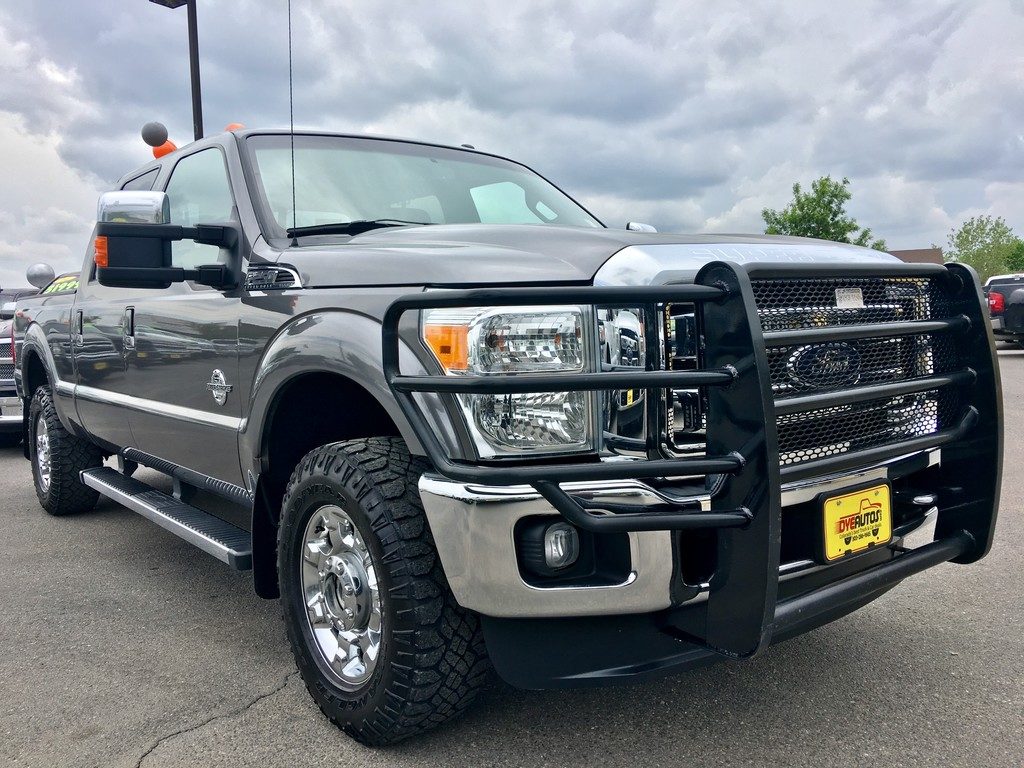 We sell a lot of pickup trucks here at Dye Autos. With our level of experience, we get a lot of questions from consumers about trucks and towing capacity. It’s important to know the details of the truck you’re considering to purchase and we’re here to help you figure that out.
We sell a lot of pickup trucks here at Dye Autos. With our level of experience, we get a lot of questions from consumers about trucks and towing capacity. It’s important to know the details of the truck you’re considering to purchase and we’re here to help you figure that out.
To choose the best pickup for towing, truck shoppers should consider the factors that contribute to towing capability.
Start by asking yourself two simple questions will help you narrow your choices:
- What do you plan to tow?
- How will you use your pickup when you’re not towing?
If you’ll often use your pickup without the trailer, you’ll want to choose a vehicle that suits those needs, too. You’ll want to choose a lighter or more-efficient pickup that’s able to handle your trailer but is also a ride that you can live with every day.
Determine the size and weight of your trailer.
You’ll need to find out the Gross Vehicle Weight Rating (GVWR) of what you’re going to tow.
You’ll find this on the trailer “VIN plate” (Vehicle Identification Number) or by contacting the trailer manufacturer. The GVWR is the dry weight of the trailer (empty weight) plus the maximum allowed payload.
- Your trailer may be as little as a 12-ft pop-up camper with a GVWR of under 3,000 lbs.
- Perhaps, it’s a behemoth conventional camping trailer that is 40-ft long and approaching 14,000 lbs GVWR.
- How about a triple-axle 43-ft long 5th-wheel toy hauler that is pushing a total weight rating of 20,000 lbs?
- It may be a large boat, a cargo trailer, or a horse trailer.
Figure out the GVWR of the trailer, as well as the loaded weight of your specific setup.
Light Duty or Heavy Duty Pickup Truck?
Some light-duty trucks offer huge towing capacities in excess of 10,000 pounds, but drivers with big trailers, such as fifth-wheel campers or gooseneck horse trailers, may be better off with a heavy-duty pickup, such as the Ford F250 Super Duty, Dodge Ram 2500, or Chevy Silverado. Again, frequency of use is a consideration.
“The Ford F150 Ecoboost with Max Tow has trailer pulling capability that works well for many of our customers. It’s actually better than a diesel because it generally costs less and has less maintenance.” – Scott Dye
If you plan to tow a personal watercraft or a light-utility trailer, you may not even need a full-size pickup. Consider a smaller truck, such as the Toyota Tacoma or the upcoming Chevy Colorado, if you’re only pulling a light trailer.
Do I need a 4×4?
A 4×4 can be very handy, especially for pulling a trailer on uneven surfaces. A slippery boat ramp, soft ground or a hill with loose gravel might spell trouble for a 2-wheel-drive pickup, but a 4×4 should be able to climb right out, trailer in tow.
Four-wheel-drive pickups typically have slightly lower towing capacities than their 2-wheel-drive counterparts due to the extra weight of the 4-wheel-drive components.
What all this means for you…
Bottom Line? The best pickup for towing is the one that’s rated to pull your trailer and will suit your needs even when you don’t have a trailer behind you.
The task of determining the towing capacity of a particular pickup may seem daunting with so many factors coming into play. We can help you determine the best pickup truck for your specific lifestyle and needs. Get in touch >>here<< or call us at (303) 286-1665.
We’re here to help!
Read More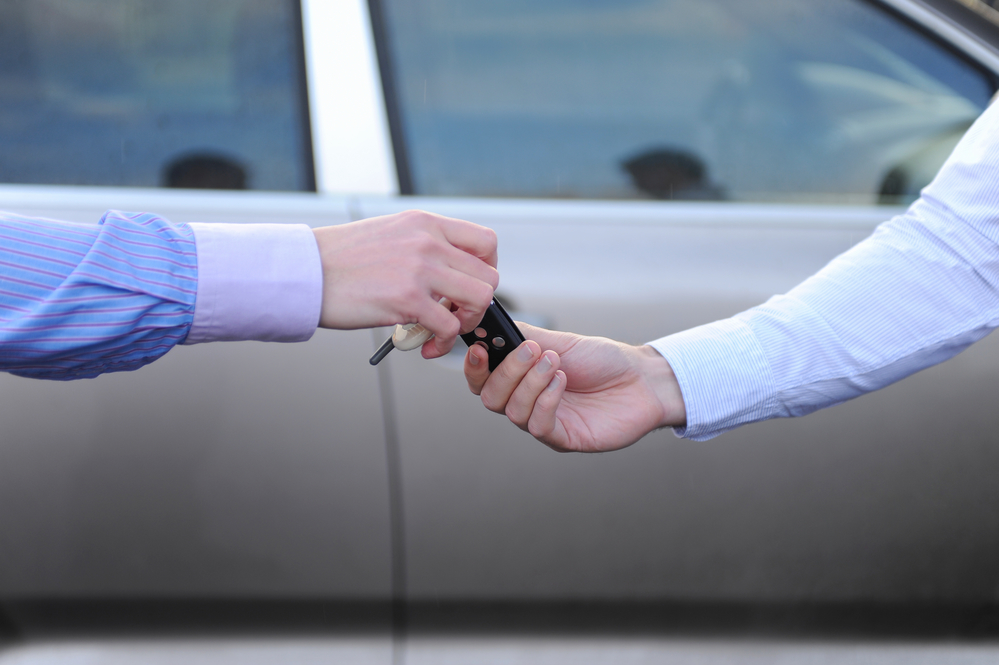
You’re ready to get rid of your current car and get yourself a new one. For many vehicle owners, there’s nothing easier than trading in a car to a local Denver dealer. That way, you avoid the time and effort it takes to list, find a buyer and sell your vehicle online; plus, dealers today are working to make the trade process fast, easy and transparent.
Before you visit the dealer, be sure to take these important steps:
- Use online tools to appraise your car’s value. Edmunds.com and kbb.com are two great resources to appraise your trade-in’s value.
- Be honest with yourself about your car’s trade-in condition. The more forthright you are when using online appraisal tools, the better off you’ll be when it comes time to trade it in. Very often, people come into the dealership with an overly-optimistic idea of what their car is worth, only to find that reality is less optimistic.
- Give your trade-in curb appeal.
- Clean the exterior and interior well.
- Remove small dents.
- Fix window glass defects.
- Bring all vehicle paperwork with you. You will need:
- Certificate of title (if you don’t have it, the DMV can tell you how to get it replaced). Note: if you have an outstanding loan on the vehicle, this will not apply since the bank has your certificate of title.
- Current registration.
- All your car keys and the owner’s manual.
- If you still have a loan on the car, you’ll need to have your account number or a payment stub.
- Maintenance records. These help support your claims about whatever prior damage your car has had and the repairs it has undergone.
When you arrive at the dealership
Inform your salesperson that you will be trading in a car. The salesperson will likely take down some of your information, then either the salesperson or a manager will perform a visual inspection of your vehicle, record the vehicle identification number and run the number through a vehicle history database to check its records.
The salesperson or manager may take your car for a quick drive to see how it runs.
Getting your trade-in offer
The trade-in offer you receive will depend on several factors, but mostly it will rely on the price being sought for similar vehicles at auction. Other possible factors include whether or not the dealer has similar cars on the lot already, the condition of your vehicle and whether the dealership needs to make any repairs to make your trade-in ready for other buyers.
Since you’re trading in your car in order to buy another one, negotiating the price for your trade-in will include the car you’re buying.
Paying off your trade-in’s loan & finishing up your deal
When you’re trading in a car, there may be a little more wiggle room on your trade-in value against the price of the car you’re hoping to buy.
When the amount you owe on the car is less than the trade-in value, the process is pretty straightforward. Say you still owe $5,000 on your car and a dealer offers you $6,000 for it as a trade-in. The dealer pays off the $5,000 loan for you and then you transfer ownership of the car to the dealer. You can use the difference (in this example it’s $1,000) as a down payment on the car you’re buying.
When the amount you own on the car is more than the trade-in value, the dealer still pays off your loan. This leaves a balance due to the dealer which you can either pay cash for, or sometimes, roll that amount into the new loan you’re getting on the new car. Various factors like creditworthiness, terms and payment amounts govern which options you’ll take.
Dye Autos helps people like you trade-in their cars and trucks everyday! Give us a call at (303) 286-1665 or contact us >>here<<. We’ll help you navigate the process of trading in a car and get you into the car of your dreams.
Read More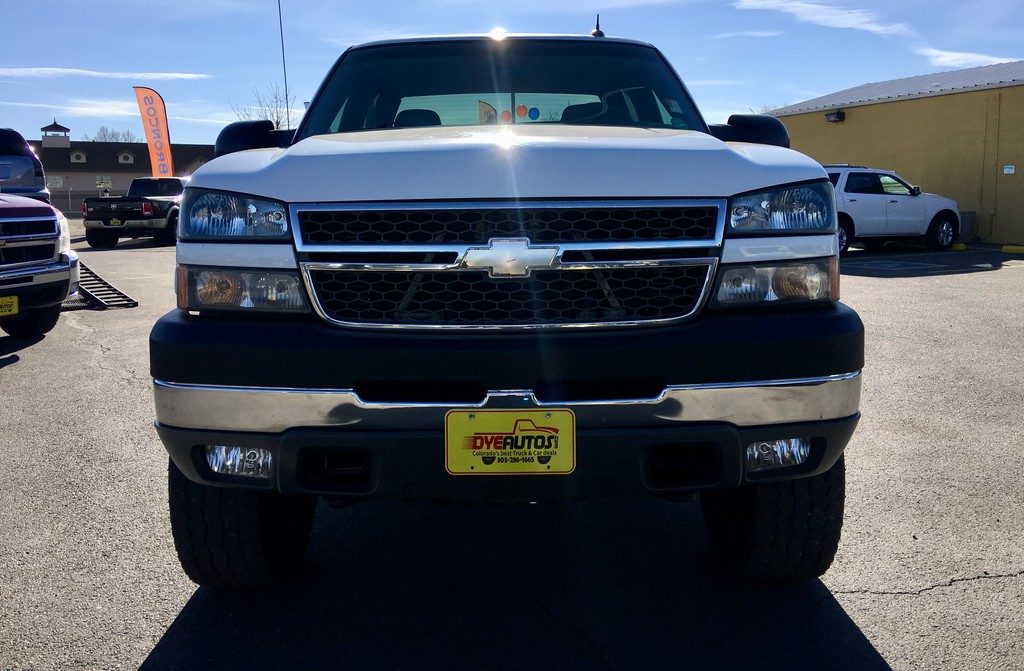 With the value and options available today, just about everyone can enjoy the benefits of a pickup truck. Whether your an outdoors type, a suburbanite, or somewhere in between, you can enjoy the toughness, power and utility of these marvels of modern automotive engineering.
With the value and options available today, just about everyone can enjoy the benefits of a pickup truck. Whether your an outdoors type, a suburbanite, or somewhere in between, you can enjoy the toughness, power and utility of these marvels of modern automotive engineering.
With pickup trucks claiming three spots out of ten on the list of top selling vehicles in 2017, there’s no question that trucks are hot.
Here’s a list of our top 10 reasons to buy a pickup truck.
1. Truck are no longer “penalty boxes.”
Today’s trucks ride like sedans.
Gone are the days when trucks had just a front seat and the ride was so bumpy you thought you might lose a kidney.
A super-smooth ride, roomy back seats, and four doors are standard now, as are many of the amenities on most sedans, including heated seats and keyless entry. The ride is comfortable and quiet (but ready to take on the world).
2. Trucks are the perfect weekend adventure vehicle.
Even though they’re a bit softer on the inside, pickup trucks are still designed to conquer difficult terrain. No matter what the road conditions, a modern pickup truck can push through and get you to your destination.
Whether you need to traverse an off-road trail to get to your favorite remote campsite or pound snowdrifts into submission to get to the ski resort, a good, properly equipped pickup can get you there.
3. Trucks tow your stuff.
Whether you’re taking the boat to Sloan’s Lake or Cherry Creek, the snowmobile to Steamboat Springs or Breckenridge, or your kids’ furniture to that first apartment, a pickup truck gives you the power to tow whatever you need. Many popular pickups can tow up to 12,000 pounds while the larger, heavy-duty models can pull up to 22,500 pounds or higher.
4. Trucks are affordable.
Used pickup truck models are especially affordable and often retain their value. At Dye Autos, we’ve got a large inventory of affordable pickup trucks for every budget.
Not sure what you can afford? Call us at (303) 286-1665.
5. Trucks grab attention.
In Denver, few vehicles command the same kind of attention as pickup trucks. For the type of person who demands that their vehicle “go big or go home” you can’t beat a pickup truck. Remember, being noticed is better than being ignored.
6. Trucks make you the hero of the neighborhood.
Your pickup truck can help score a few extra Good Samaritan credits by providing the grunt to give neighbors a tow when their cars get stuck in the snow. A pickup truck also makes it easier to help haul saplings — plus a jungle gym for the children — to the local park.
7. Trucks are safe.
First, you’re sitting high, so you can see better.
Today’s trucks also have the same safety features drivers look for in cars — four-wheel drive, electronic stability control system, air bags, dynamic braking, blind zone alerts, and so on. In addition, some have advanced safety features.
The high-strength steel body of some trucks is preferred by safety-conscious drivers over aluminum for a light but strong truck body.
8. Trucks are the ultimate tool box.
Trucks are now so common, it’s easy to overlook how important they are. But as they build and maintain the infrastructure that keeps society moving, their importance and usefulness as the ultimate tool just can’t be denied.
If there’s one tool that rules over all, it is the pickup truck. It’s both the ultimate tool and the ultimate toolbox; it can haul lumber, clear land and then serve as a repository for the tools needed to build a home.
9. Trucks are made for snow.
Winter tires on a sedan or a small hatchback will only get you so far. If the snow is deep enough, you can literally high-center a car once it gets packed underneath.
With the additional ground clearance afforded by a pickup, traversing 10 inches of fresh plow is no problem.
10. Trucks support ALL your activities.
Pickup trucks help you work hard and when it’s time to relax, they help you do that too!
Load your pickup truck bed with anything from lumber to furniture to camping equipment, and drive anywhere — even on the roughest terrain. You can even us your truck as a substitute family room while camping. Watch Netflix under the stars in your truck bed!
Did we give you enough reasons to buy a pickup truck?
You may even have some more reasons of your own but remember this: when it’s time to buy, you’d better call Dye!
Read More



